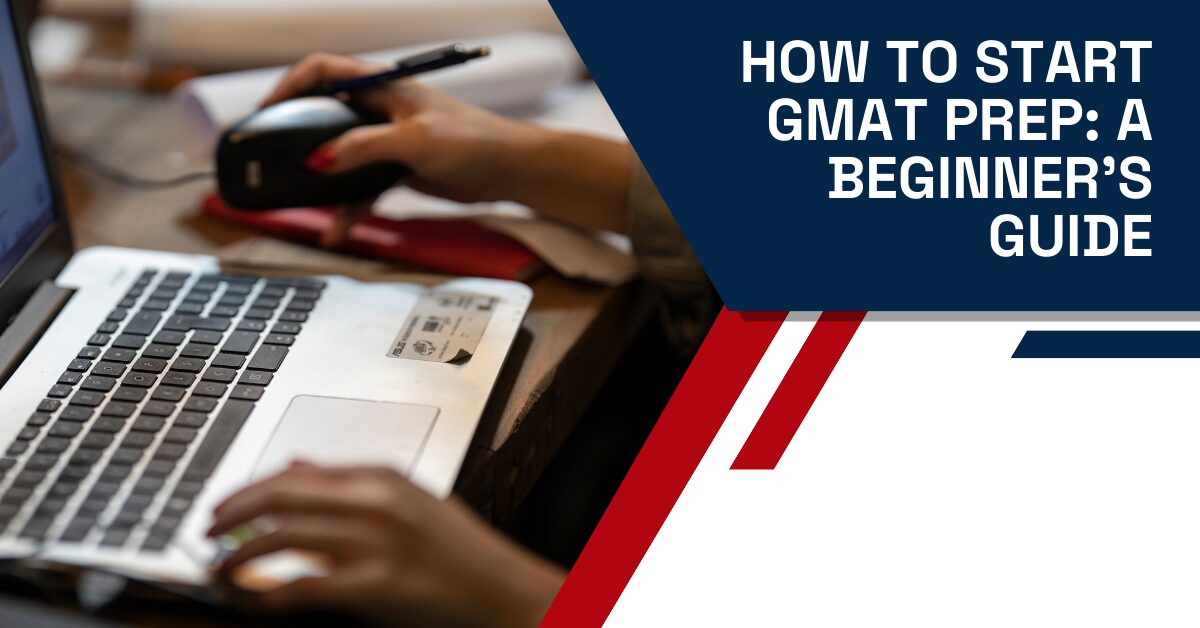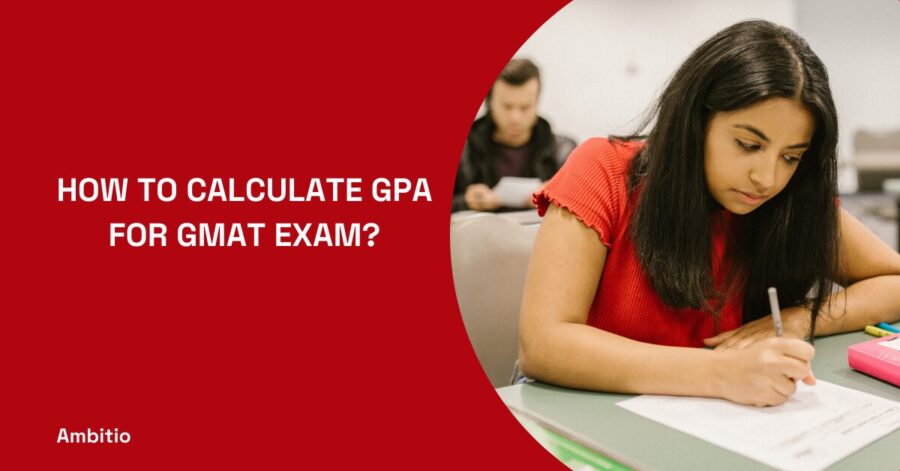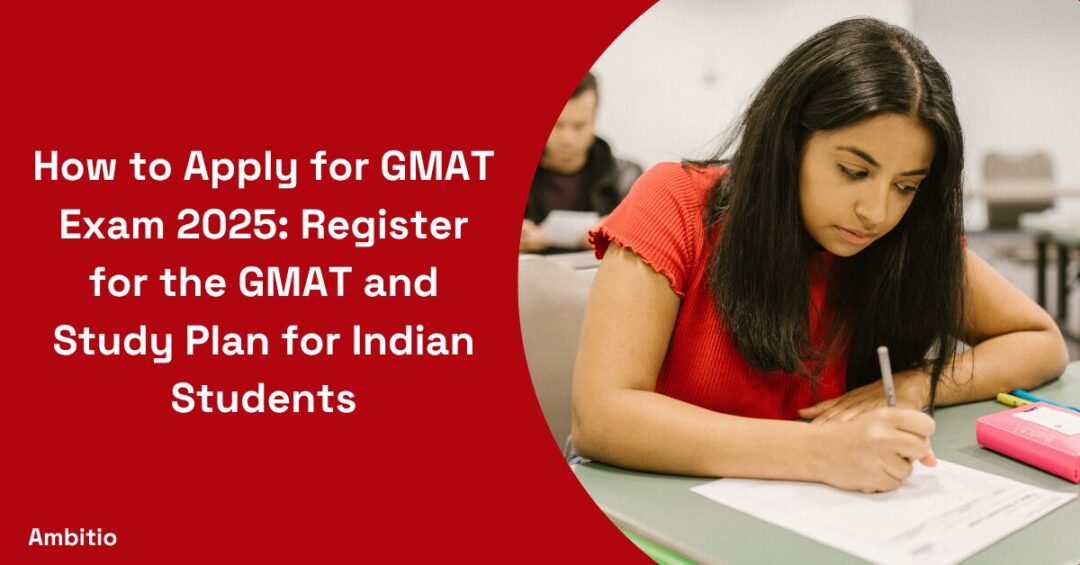2 September 2024
7 minutes read
How To Start GMAT Prep: A Beginner’s Guide

Key Takeaways
- Develop a highly customized and strategic GMAT study plan that analyzes and precisely targets your weak areas.
- Along with building content knowledge, focus on honing critical test-taking skills like efficient time management.
- Incorporate unique expert strategies like blind reviewing questions, and maintaining an error log for pattern analysis.
- Rigorously simulate real test-day conditions by taking full-length mocks, and timed practice sections.
- Start the GMAT prep journey as a life-changing process by maintaining the right mindset.
Aspiring for an MBA? The GMAT exam is your gateway. This Graduate Management Admission Test assesses your analytical, quantitative, verbal, and writing abilities through sections like GMAT Analytical Writing Assessment (AWA), Integrated Reasoning, Quant, and Verbal. With a good GMAT score, you increase your chances of getting into top-notch business schools.
Starting your study for the GMAT preparation is crucial. Utilize official guides, GMAT prep resources, and practice tests to familiarize yourself with the exam format, question right types (sentence correction, reading comprehension, data sufficiency, etc.), and GMAT time management strategies, and learn from your wrong answers.
Join GMAT clubs or enrol in an online course to access quality study materials and peer support. Whether you self-study or opt for test prep classes, create a structured study plan of 45 days at least or more, focusing on your strengths and weaknesses. By putting in the work, you can conquer every GMAT question and maximize your score on GMAT test day – but the effort it takes to get started is appreciable.
This beginner’s guide covers everything you need to know about preparing for the Graduate Management Admission Test exam.
How to Get Started for GMAT Prep?

Begin by taking a GMAT practice test to establish a baseline score. Review the exam report to identify your weak areas in quantitative reasoning and verbal skills. Don’t fall into the trap of finding certain topics or question types irrelevant. On the actual GMAT, you can get any type of question. Here are some tips to get started with the GMAT preparation journey:
Initial Assessment
Take a diagnostic GMAT practice papers for test to establish your baseline score and round 1 performance. Thoroughly analyze the report to identify your weak areas and determine if you need more focus on quantitative reasoning, verbal reasoning, or both sections. Don’t fall into the trap of finding any topics or question types irrelevant – on the actual GMAT exam, you can get any type of question.
Quantitative Section Preparation
Dedicate ample study time for the GMAT quant section using the Official Guide and other comprehensive resources like Manhattan Prep books. Master problem-solving and data sufficiency questions – the two main quant question types. Practice regularly from the curated problem sets and quantitative review sections to improve accuracy and time management skills for these quantitative problems.
Verbal Section Preparation
The GMAT verbal section tests reading comprehension, critical reasoning, and sentence correction skills. Use the Official Guide for GMAT verbal review and practice sets to build a strong grammar foundation. Learn strategies for different verbal question types and practice extensively until you can confidently answer sample questions correctly under timed conditions.
Study Materials and Resources
Invest in the latest editions of the GMAT Official Guides – these comprehensive books contain real GMAT questions for robust practice. Supplement with online resources like GMAT courses with interactive video lessons and performance analytics to focus your GMAT prep efforts. Join online GMAT forums or local study groups for support during your GMAT journey.
Practice Tests
Periodically take full-length GMAT practice exam papers replicating the actual 3.5-hour exam day experience, including breaks. Analyze your performance report to identify weaknesses and update your study plan accordingly. Consistent practice under timed conditions builds the stamina needed for this lengthy, standardized test.
Test-Taking Strategies
Learn robust test-taking strategies like process of elimination and answer elimination to improve efficiency. Develop time management skills – it’s critical to pace yourself appropriately on this challenging exam. Practice skipping and returning to tough questions rather than getting bogged down.
Reducing Exam Anxiety
GMAT exam anxiety is common but manageable with the right techniques. Incorporate stress-busting practices like deep breathing, visualization, and positive self-talk. Get adequate rest, nutrition, and exercise leading up to test day. Remember, your private score report doesn’t impact applications – GMAT prep is a journey towards your MBA program admission goal!
Beneficial GMAT Preparation Tips for Beginners

To achieve a high GMAT score and secure admission to your desired MBA program in top business schools in USA, beginners should develop a comprehensive study plan, utilize official resources, and practice consistently.
Leverage Online GMAT Communities
Join active GMAT forums like GMAT Club to get advice from peers and experts and beat the GMAT. Participate in online study groups to discuss strategies, review practice questions, and stay motivated. Subscribe to GMAT blogs/newsletters for the latest test updates and prep hacks.
Create a Consistent Study Routine
Develop a study schedule that allocates enough time for comprehensive GMAT preparation of 6 months. Consistency is key – regular practice from official guide problem sets will help solidify your quantitative and verbal skills. Don’t cram; instead, explore topics in-depth and learn to apply concepts accurately under timed conditions.
Simulate Real Test Conditions
Periodically take full-length GMAT practice papers that accurately simulate the 3.5 hours of actual exam experience, including breaks and strict time limits. Analyze performance reports after each test to identify areas for improvement. Update your study choices and approach based on this feedback to progressively enhance your GMAT readiness.
Test-Taking Strategies
Along with studying content, beginners must learn robust test-taking strategies for the GMAT. Time management is a critical skill on this standardized test. Practice strategies like the process of elimination for tough questions. Find methods to manage exam anxiety through relaxation techniques for optimal performance.
10 Expert GMAT Test Prep Strategies
From learning techniques to approach different question types efficiently to managing exam anxiety, incorporating specific strategies into your 1 or 2 months GMAT study plan is vital. With a strategic framework, you can apply your skills optimally, make educated guesses when needed, and maintain stamina through the 3.5-hour-long exam.
Here are 10 expert strategies that will help you crack the GMAT exam effectively – if followed properly:
Blind Review Strategy
After taking a full-length GMAT practice test, review the quantitative reasoning and verbal reasoning questions you didn’t answer correctly without looking at explanations first. Re-work official GMAT problems, applying regular practice to arrive at the right solutions independently before analyzing.
Customized Error Log
Maintain a detailed log categorizing the types of GMAT quantitative problems and verbal skills questions from the official GMAT exam that expose your weak areas. Analyze this frequently while preparing for GMAT to prioritize weak points needing more study time. Update your GMAT prep choices based on patterns you identify.
Timed Practice Drill
Simulate actual test conditions by giving yourself the standard 3.5 hours and taking the GMAT practice questions under timed conditions. Build skills to make educated guesses and move on if you can’t immediately solve that problem type. Practicing this way replicates the time pressure of the real GMAT.
Flawed Approach Analysis
For questions you got wrong on GMAT practice tests, don’t just look at the correct answer choice and move on. Analyze your entire approach and thought process that led you to the incorrect answer. Understanding WHY you made a mistake is far more valuable than simply seeing the right solution. This crucial insight prevents you from repeating the same errors on test day.
Verbal Section Journaling
After practicing verbal questions, summarize the key points and author’s perspective from Reading Comprehension passages and arguments from hundreds of Critical Reasoning questions in a journal. This active reviewing technique reinforces comprehension abilities.
Creative Problem-Solving
For the Quantitative section, don’t solely rely on the standard algebraic techniques you learned. Practice solving GMAT quantitative problems using multiple approaches like picking numbers, estimating, or applying clever mental math shortcuts. This flexibility will come in extremely handy when dealing with time pressure on test day.
Non-Test Scenario Application
Actively look for opportunities in everyday life to apply the logical reasoning, quantitative, and verbal skills you’re developing during your GMAT prep. Relating concepts to real scenarios deepens understanding.
Focused Guessing Elimination
For questions you can’t confidently answer, use the process of elimination strategically on remaining answer choices rather than haphazardly guessing. Look for grammatical errors, logical flaws, or numerical inconsistencies to narrow it down.
Testing Mindset Journaling
In the week before your exam, maintain a daily journal capturing your thoughts, concerns, and mindset. Re-reading this journal on test day can reorient your focus back to your GMAT preparation journey’s highlights and goals.
Mock Test Role-Play
Role-play complete mock tests with a study partner, taking turns to play the role of the proctor and test-taker. Recreate the structured breaks and exam environment. This mental conditioning prepares you for the actual 3.5-hour endurance test.
Conclusion
Remember, your score is just one component of your MBA application; the preparation process itself builds invaluable skills that will serve you well in business school and beyond. Stay focused, believe in yourself, and let this be the first step towards achieving your academic and professional aspirations.
Consider maintaining a GMAT preparation journal to track your progress, document concepts you struggle with, and record eureka moments. Reviewing your journal periodically can provide insights into your learning patterns, motivate you during lulls, and serve as a valuable resource when revisiting topics before the actual exam.
Transform your GMAT preparation with Ambitio’s expert guidance. Our comprehensive approach includes personalized study plans, adaptive practice tests, and strategic insights, all designed to enhance your understanding and performance across the exam’s quantitative and verbal sections.
FAQs
What is a “good” GMAT score?
Your GMAT score out of 800 is based on your performance across all sections. The definition of a “good” score varies by program, but typically a score around the class average (often 600+) is considered competitive, while 700+ is expected at top schools. Ultimately, the right score is one that helps you get into your target program.
Can I use a calculator on the GMAT?
You will have access to an on-screen calculator with basic functions during the Integrated Reasoning section, but not on the Quantitative section. However, the quant questions are designed to not require detailed calculations.
Will I get scratch paper during the GMAT?
How is the GMAT scored?
When should I take the GMAT?
How does the GMAT differ from the GRE?
The key difference is that the GMAT was created specifically for business school admissions, while the GRE is for a broader range of graduate programs. Over 7,700 business schools worldwide accept the GMAT

You can study at top universities worldwide!
Get expert tips and tricks to get into top universities with a free expert session.
Book Your Free 30-Minute Session Now! Book a call now




























